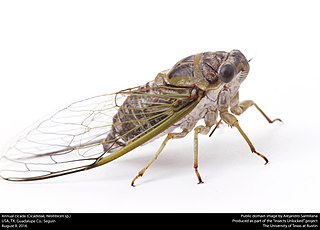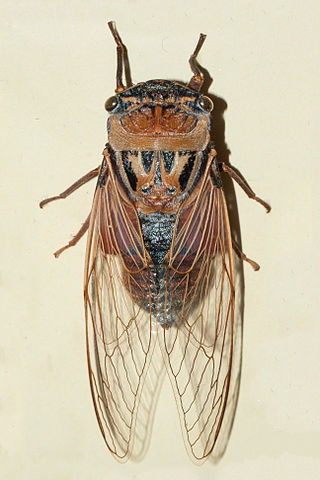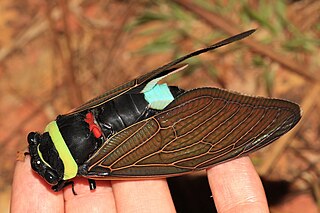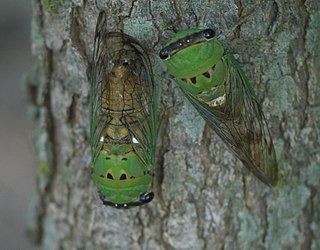
The cicadas are a superfamily, the Cicadoidea, of insects in the order Hemiptera. They are in the suborder Auchenorrhyncha, along with smaller jumping bugs such as leafhoppers and froghoppers. The superfamily is divided into two families, the Tettigarctidae, with two species in Australia, and the Cicadidae, with more than 3,000 species described from around the world; many species remain undescribed.

Cicadidae, the true cicadas, is the largest family of cicadas, with more than 3,200 species worldwide. The oldest known definitive fossils are from the Paleocene, a nymph from the Cretaceous Burmese amber has been attributed to the family, but could also belong to the Tettigarctidae.

Cicadas of the genus Neotibicen are large-bodied insects of the family Cicadidae that appear in summer or early fall in eastern North America and formerly Bermuda. Common names include cicada, harvestfly, jar fly, and the misnomer locust.

Tosenini is a tribe of cicadas in the family Cicadidae. There are at least 10 described species in Tosenini, found in the Palearctic and Indomalaya.

Thopha saccata, the double drummer, is the largest Australian species of cicada and reputedly the loudest insect in the world. Documented by the Danish zoologist Johan Christian Fabricius in 1803, it was the first described and named cicada native to Australia. Its common name comes from the large dark red-brown sac-like pockets that the adult male has on each side of its abdomen—the "double drums"—that are used to amplify the sound it produces.

Psaltoda plaga is a species of cicada native to eastern Australia, from Maryborough in central Queensland to Bega in southern New South Wales. Adult cicadas appear over the summer and inhabit forested areas near bodies of water. The predominantly black form from the Sydney and Central Coast regions is commonly known as the black prince, while the term silver knight is used for the species as a whole.

Tacua speciosa is a very large Southeast Asian species of cicada. It is the only member of the genus Tacua.

Cicada is a genus of old world cicadas in the family Cicadidae, and the tribe Cicadini. There are at least 60 described species in Cicada.

Huechys is a genus of cicada belonging to the family Cicadidae.

Megatibicen is a genus of cicadas in the family Cicadidae, with about 10 described species. Until 2016, these species were included in the genus Tibicen and then briefly in Neotibicen. The species formerly of genera Ameritibicen Lee, 2016 and Gigatibicen Lee, 2016 are now considered species of Megatibicen Sanborn & Heath, 2016.

Neotibicen lyricen, the lyric cicada, is a species of cicada in the family Cicadidae.

Neotibicen pruinosus, commonly known as the scissor grinder, is a species of cicada in the family Cicadidae.

Neotibicen superbus, the superb dog-day cicada, is a species of cicada in the family Cicadidae. It is the greenest cicada in the neotibicen genus. It has reduced black patterning and looks different than most other cicadas in its genus. Its song is a soft buzz that reaches a crescendo.
Burbunga is a genus of cicadas in the family Cicadidae, found in Australia. There are about 11 described species in Burbunga.
Cicadmalleus is a genus of cicadas in the family Cicadidae, found in Indomalaya (Thailand). There is at least one described species in Cicadmalleus, C. micheli.
Distantada is a genus of cicadas in the family Cicadidae, found in the Mascarene Islands. There is at least one described species in Distantada, D. thomasseti.
Durangona is a genus of cicadas in the family Cicadidae and the monotypic tribe Durangonini, found in South America.
Jassopsaltria is a genus of cicadas in the family Cicadidae, found in Australia. There is at least one described species in Jassopsaltria, J. rufifacies.
Lahugada is a genus of cicadas in the family Cicadidae, found in India. There is at least one described species in Lahugada, L. dohertyi.

Dundubia vaginata is the type species in its genus, sometimes called the jade-green cicada in the tribe Dundubiini.














